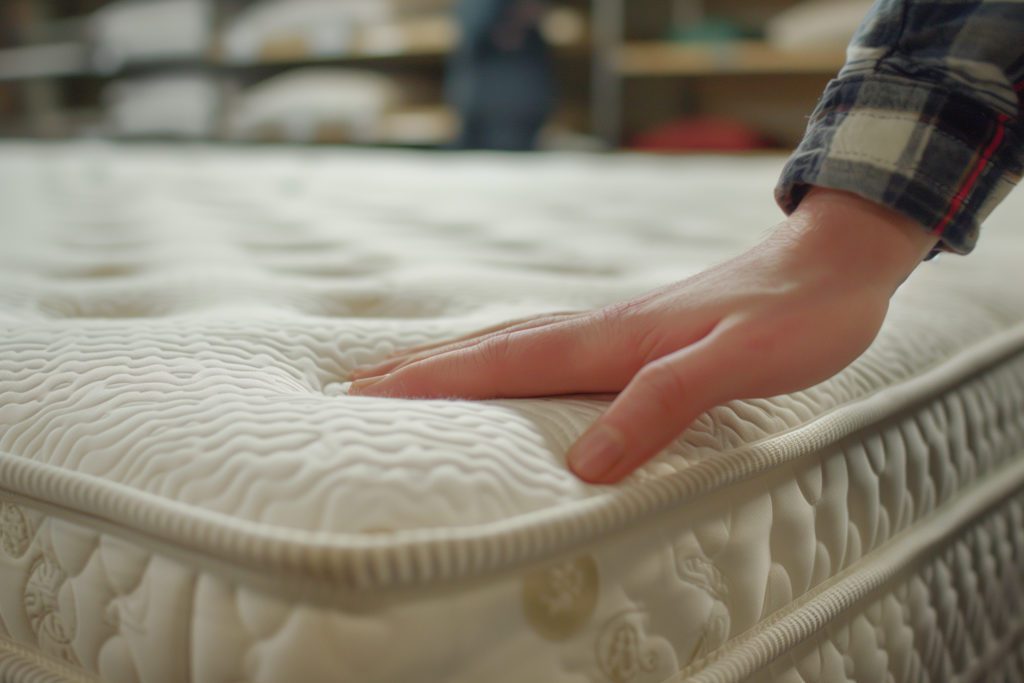
How to Improve Sleep Quality During Your Period: Expert Tips and Advice
Are you struggling with sleep during your period? Let's discover expert tips to ease cramps, manage emotions, and create a sleep-friendly environment!

Getting quality sleep during your period can feel like a challenge. The combination of cramps and bloating that hormones bring can make sleeping quite a challenge. Additionally, it's common to feel like your bed is less inviting during this time of the month.
Periods don’t just mess with your plans. They also mess with your sleep. From disrupted hormone levels to physical discomfort, there are several reasons why your sleep might be affected. But don’t worry—help is here! In this article, we’ll discuss expert tips and scientifically backed advice on how to sleep during your periods. It’s all about understanding your body and making small, manageable changes that lead to better sleep.
Why Periods Affect Your Sleep?
It turns out that the hormonal shifts during your menstrual cycle don’t just impact your mood but also interfere with your body’s ability to get good-quality rest.
A study published in Sleep Medicine Research found that women are more likely to report sleep disturbances in the luteal phase (the week before their period) due to hormonal changes and physical symptoms like bloating and cramps. The same study highlighted that sleep quality often improves after menstruation starts, though this isn’t a universal experience.
So, if you’re tossing and turning, you’re not imagining it—your body is genuinely working overtime to adjust to these changes. But don’t worry, better sleep is not a dream. Keep reading for tips that’ll have you sleeping like a log.
Dietary and Lifestyle Adjustments for Improved Sleep
They say you are what you eat, and when it comes to sleeping during your period, your diet plays a bigger role than you might think.
Foods to Eat
Let’s start with the good stuff. Magnesium-rich foods like bananas, almonds, and dark chocolate are known for their muscle-relaxing properties. A clinical trial found that magnesium supplementation significantly improved sleep quality in women experiencing premenstrual symptoms.
Foods to Avoid
But not all foods are the same. Caffeine and alcohol are known to interfere with sleep cycles, and during your period, they can also exacerbate bloating and cramps. So, as much as you might crave that third coffee or a glass of wine, it’s worth skipping them, at least before bedtime.
Lifestyle Changes
Light activities like yoga or stretching can release endorphins, which help manage pain and reduce stress. And let’s not forget hydration. Drinking enough water throughout the day can reduce bloating, making it easier to get comfortable in bed. If plain water sounds boring, try herbal teas like chamomile or peppermint, both of which have soothing, sleep-promoting properties.
Create a Sleep-Friendly Environment
When it comes to sleeping well during your period, your bedroom should feel like a personal retreat. Creating a sleep-friendly environment might sound fancy, but it’s really about small changes that can make a big impact.
Your body’s internal clock is heavily influenced by light exposure, so dimming the lights an hour before bedtime can signal to your brain that it’s time to wind down. Noise matters, too. A white noise machine or even a fan can drown out disruptions and help you fall asleep faster.
Expert Advice for Managing Emotional Challenges
You know that periods don’t just mess with your body. They can influence your emotions, too. Between mood swings and stress, it’s no wonder sleep feels elusive. But don’t worry—we are here to help.
You can start by acknowledging the emotional changes as normal. Hormonal shifts, particularly fluctuations in estrogen and progesterone, can affect serotonin levels, which impact mood. A study in Clinical Psychology Review revealed that these hormonal changes are directly linked to increased anxiety and sleep disturbances in menstruating individuals.
One practical tip is journaling. Writing down your thoughts before bed can help offload worries, making it easier to relax. Pair this with mindfulness exercises like deep breathing or progressive muscle relaxation to calm your mind.
If anxiety is the main culprit, consider scheduling your most stressful tasks earlier in the day. Tackling challenges head-on can leave you feeling accomplished and less stressed by bedtime.
Managing Physical Discomfort for Better Sleep
The physical discomfort of your period is one of the biggest barriers to restful sleep. The good news is that there are plenty of ways to ease the pain and get cozy.
Heat Therapy
Applying a heating pad to your lower abdomen works wonders. A study in Obstetrics and Gynecology found that heat is just as effective as ibuprofen in reducing menstrual cramps.
Sleeping Position
Another tip is to experiment with your sleep position. The fetal position is not only comfortable but also helps relieve pressure on your abdominal muscles. If you’re a back sleeper, consider propping up your knees with a pillow to ease lower back pain.
Sleep Environment
Breathable, lightweight fabrics for bedding and pajamas can help regulate your body temperature, which tends to fluctuate during your period. While it might be tempting to burrow under a mountain of blankets, keeping your room slightly cool can actually promote deeper sleep.
Feeling too crampy for all this prep? No pressure. Even small efforts—like popping a hot water bottle into bed—can make a big difference. The key is to listen to your body and pamper it. After all, you deserve comfort.
The Bottom Line
Sleeping well during your period doesn’t have to be a dream. By understanding your body’s unique needs, making small but meaningful changes, and incorporating expert-backed strategies, you can improve your sleep quality—even when hormones and cramps seem determined to keep you up.
Remember, how to sleep during your periods is less about perfection and more about finding what works best for you. So, experiment with these tips, be patient with yourself, and rest assured—better sleep is just a few mindful steps away.
FAQ
Can hormonal birth control improve sleep quality during menstruation?
Hormonal birth control can help regulate estrogen and progesterone fluctuations that impact sleep quality. It may reduce common sleep disturbances by alleviating PMS symptoms like cramps, bloating, and mood swings. However, individual responses vary—some may experience improved sleep, while others might notice side effects like insomnia or fatigue. Always consult a healthcare provider for personalized advice.
Does exercise before bedtime help or hinder sleep during menstruation?
Light exercise, like yoga or gentle stretching, can help alleviate period-related discomfort, reduce stress, and promote relaxation, making it easier to fall asleep. However, intense workouts close to bedtime may raise body temperature and increase adrenaline levels, making it harder to wind down. It's best to exercise earlier in the day to reap sleep benefits without disruptions.
Can herbal teas or natural remedies improve sleep during menstruation?
Herbal teas, such as chamomile, valerian root, and peppermint, have natural calming effects that can ease menstrual discomfort and promote relaxation. Chamomile, in particular, contains compounds that may improve sleep quality by reducing anxiety and promoting muscle relaxation. However, caffeinated teas, such as black or green tea, should be avoided before bedtime, as caffeine can interfere with sleep by increasing alertness and potentially worsening period-related insomnia.
Is sleep quality affected differently in each phase of the menstrual cycle?
Yes, hormonal fluctuations during different phases of the menstrual cycle can affect sleep patterns. The luteal phase, leading up to menstruation, often causes increased body temperature, mood changes, and bloating, making it harder to sleep. Sleep typically improves once menstruation starts, as progesterone levels drop. Tracking cycles can help anticipate sleep disruptions.
Can changing sleep positions help relieve period discomfort?
Yes, adjusting sleep positions can provide relief from menstrual cramps and discomfort. The fetal position, for example, helps relax abdominal muscles and reduce pressure on the uterus. Sleeping on your back with a pillow under your knees can also relieve lower back pain. Experimenting with different positions can help find what offers the most comfort and support.
Is it normal to experience vivid dreams or nightmares during menstruation?
Yes, hormonal fluctuations can lead to changes in sleep architecture, potentially increasing the likelihood of vivid dreams or nightmares. Elevated progesterone levels may cause more frequent REM sleep, during which dreaming occurs. Keeping a consistent bedtime routine may help regulate sleep patterns.

Written by
Dr Aqsa
As a Medical Doctor, Dr Aqsa, uses her knowledge to craft complex medical information that is understandable to the general public. For years, she has tried to improve health literacy and empower readers with valuable health knowledge through her articles, blog posts, and educational materials.
Download Pillow
Get help
Press & News
Legal
Connect
X (Twitter)
Company
Copyright © Neybox Digital Ltd.



